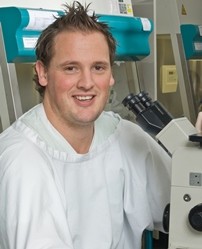Former students on winning team in world-wide cancer challenge
Two former students with the Liggins Institute Breast Cancer Research Group, Graeme Fielder and Francis Hunter, are participants in one of 10 teams which have won an international competition to accelerate the passage of emerging breast cancer research technologies to market.
Graeme first entered the Liggins Institute on a summer research scholarship in 2005, staying on to continue the research first for Bachelor of Technology degree with First Class Honours and then a PhD. Francis also joined the research programme for his honours research project before moving to PhD research with the Auckland Cancer Society Research Centre in the Faculty of Medical and Health Sciences.
The Breast Cancer Startup Challenge is sponsored by the Avon Foundation for Women, in partnership with the National Cancer Institute (NCI), part of the National Institutes of Health (NIH), and the Center for Advancing Innovation (CAI). Avon is providing US $250,000 in funding for this Challenge.
The Challenge is made up of 10 research technologies that were judged to show great promise to advance breast cancer research. These 10 inventions were developed at NCI or at an Avon Foundation-funded university lab and include therapeutics, diagnostics, prognostics, one device, one vaccine, one delivery system and one health IT invention. Teams of business, legal, medical/scientific, engineering, computer science students and seasoned entrepreneurs have evaluated these technologies to create business plans and start new companies to develop and commercialize them.
Graeme and Francis are part of the Stanford University-based challenge “Human Monoclonal Antibody Based Cancer Therapies”, led by Dr Mitchell Ho of the National Cancer Institute, which includes members from US, New Zealand and the Netherlands.
Two hundred teams expressed an interest in joining the challenge and 46 teams were accepted to compete on a range of business plan possibilities. In total, 478 people participated in the competition. Given the number of teams and people on each team, this challenge is one of the largest global university business plan challenges to date.
Fascinated by the commercialisation potential of breast cancer technologies, Graeme became involved in the University of Auckland student-led business and biotechnology entrepreneurial initiatives Chiasma and Spark, winning a number of challenges and serving as both CEO and Chair of Spark. After completing his PhD research at the Liggins Institute he held a business development position at the Crown Research Institute, Plant and Food Research. Last year’s award of a prestigious Fulbright-Platinum Triangle Award in Business allowed him join the MBA programme at Stanford University, California.
“The premise of the challenge was to develop a commercialization plan for an invention, related to breast cancer treatment and diagnosis, developed at NCI,” says Graeme.
“We worked on a new antibody-based therapeutic for the treatment of solid tumours, including breast cancer. Now we’ve won this challenge (in our category), we go forward to the next stage of the process where we see if we can actually make a company out of it,” he says.
Winners and finalists in the Breast Cancer Startup Challenge will not only be recognized for creating a business plan and pitch, as other competitions require, but they will also be invited to launch a start-up, negotiate licensing agreements and raise seed funding to further develop these NCI and Avon Foundation grantee inventions.
“We are looking forward to start-ups launching around these inventions to accelerate breast cancer research and break the mould of how research is funded,” said Marc Hurlbert, Ph.D. executive director, Avon Foundation for Women. “This new approach, through our partnership with NCI and CAI, will help translate promising inventions from the academic laboratory to development and commercialization, and ultimately benefit breast cancer patients.”
Graeme Fielder’s eventual goal is to build on the experience he is gaining overseas in bioscience research commercialisation when he returns to NZ. He is one of a number of former Liggins students who have managed to combine interests in biotechnology and business. Dr Privahini Bradoo developed her experiences from a PhD in neuroscience and an MBA at the Harvard Business School to co-found an award winning start-up company Biomine. Biomine uses mining industry technologies to capture metals and rare earths from electronic goods discarded as "e-waste".
Liggins Institute Research Director Professor David Cameron-Smith observed that Graeme’s success in the Start-up Challenge exemplifies just one of the fulfilling career paths that can follow from postgraduate study at the Institute.
Watch the Stanford team’s elevator pitch on YouTube
Read more about Privahini Bradoo’s career
Read more about Graeme Fielder's Fulbright Scholarship








